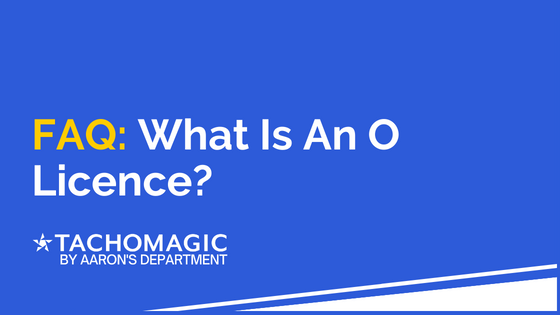Introduction - What Is An O Licence?
In the world of transportation, the Goods Vehicle Operator's Licence, or O Licence, is a must-know for businesses using heavy goods vehicles. So what is an O licence, and why is it important?
Overview - What Is An O Licence?
An operator's licence, known as an O licence, is required for the operation of commercial vehicles in Great Britain. This licence is granted by the Traffic Commissioner, an independent regulator overseeing the commercial road transport industry. The Traffic Commissioner possesses the authority to take regulatory measures against a licence holder who falls short of operational standards. These measures can include, restricting or reducing the number of vehicles an operator can manage, suspension (temporarily halting operations), or revocation (permanently withdrawing an operator’s licence to operate commercial vehicles). An O Licence is valid for 5 years, and there are three types of O Licence:
- Standard National Licence
- Standard International Licence
- Restricted Licence
What Is A Standard National Licence?
A Standard National licence means you can carry:
- your own goods in the UK and internationally
- other people’s goods in the UK
You can also take loaded trailers to or from ports within the UK as part of an international journey, as long as your vehicles do not leave the country.
What Is A Standard International Licence?
A Standard International Licence means you can carry your own goods, and other people’s goods, both in the UK and on international journeys.
What Is A Restricted Goods Vehicle O Licence?
A Restricted Goods Vehicle Operator Licence is a legal authorisation that permits a business or individual to operate a vehicle for the commercial transportation of their own goods only.

Weight Criteria - What Is An O Licence?
The need for an O Licence hinges on vehicle weight. If a motor vehicle's gross plated weight goes beyond 3,500 kilograms or its unladen weight is over 1,525 kilograms, an O Licence is required. The same applies to motor vehicle and trailer combinations, with total weights exceeding 3,500 kilograms or 1,525 kilograms, respectively. Some exemptions exist, such as for goods vehicles with trailer unladen weights below 1,020 kilograms, exclusively carrying the owner's goods.
Carrying Goods in Europe: For businesses transporting others' goods in Europe, an international licence (a subset of the O Licence) is essential. This applies to vehicles meeting specific weight limits, including vans with a maximum authorized mass (MAM) over 2,500 kilograms and cars towing trailers with a gross train weight (GTW) exceeding 2,500 kilograms.

Conclusion - What Is An O Licence?
To answer the question, What is an O Licence? The O Licence serves as the official authorisation granted by the Traffic Commissioner, who plays a crucial role in maintaining operational standards within the commercial road transport industry. The weight criteria, determining the necessity of an O Licence based on vehicle weight, underscores its significance in regulating larger vehicles. Importantly, for businesses engaged in transporting goods across Europe, the requirement for an international licence further emphasises the broad implications and importance of adhering to licensing regulations. Ultimately, a comprehensive awareness of O Licences is essential for businesses seeking to operate efficiently and legally in commercial transportation.
Further Reading
If you've found our article, "What is an O Licence?" useful, you may enjoy these further articles.

